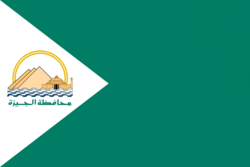Giza



Giza or Gizah (Arabic, الجيزة, transliterated al-Gīzah; pronounced in dialect of Cairo of Egyptian Arabic eg-Gīza; also sometimes spelled in English as Gizeh, Ghizeh, or Geezeh) is a city in Egypt. It is on the west bank of the Nile river. It is about 20 km southwest of central Cairo. Today it is part of the greater Cairo metropolis. It is the capital of the Al Jizah Governorate, and is near the northeast border of this governorate in coordinates 29°59′00″N 31°08′00″E / 29.98333°N 31.13333°E. It is right on the banks of the Nile River. It had 4,779,000 people living in it in 1998.
Giza is known for being the place where the Giza Plateau is. The plateau is the site of some of the most impressive ancient monuments in the world. There are a complex of ancient Egyptian royal mortuary and sacred structures there. These include the Great Sphinx, the Great Pyramid of Giza, and a number of other large pyramids and temples.
The Great Pyramid of Giza was once advocated (1884) as the location for the Prime Meridian, a reference point used for determining a base longitude.[1]
History
[change | change source]Giza's most famous archaeological site, the Giza Plateau, holds some of the most astonishing monuments in Egyptian history. Once thriving with the Nile that flowed right into the Giza Plateau, the Pyramids of Giza were built overlooking the ancient Egyptian capital of Memphis, which was near modern-day Cairo.
The Giza Plateau is also home to many other Ancient Egyptian monuments, including the tomb of Pharaoh Djet of the First dynasty as well as that of Pharaoh Ninetjer of the Second dynasty.
The city itself has seen changes over time. Changes in infrastructure during the different occupations of Egypt by various rulers, including the British in the 19th and early 20th century, focused on the construction of roads, streets, and buildings in the area. It is commonly misunderstood that the Giza area is a complete desert area; however, Giza has become a thriving centre of Egyptian culture and is quite heavily populated, with many facilities and buildings in the current area. Giza saw much attention in particular to its vast amount of ancient Egyptian monuments found on the Giza Plateau, and has astonished thousands of visitors and tourists over the years. Giza's infrastructure saw much attention from both the British government prior to the 1952 coup d'état as well as the current Egyptian government due to the city's importance in tourism.
Parts of Giza include Alharam famous in the past for its night clubs, Zamalek predominantly populated by middle class Egyptians and relatively recently overpopulated Almohan
International access
[change | change source]Access to the city of Giza, which has its own Governorate adjacent to the governorate of Cairo, is dependent on Cairo International Airport, since no official International Airport is located in Giza.
Fictional references
[change | change source]Giza is also known for its appearance as a dig and discovery site in the fictional universe of Stargate. An interplanetary transportation device is found and is the central basis for a movie and 2 popular television shows.
Twin towns – sister cities
[change | change source] Los Angeles, United States
Los Angeles, United States Bergen, Norway
Bergen, Norway Rinkeby, Stockholm, Sweden
Rinkeby, Stockholm, Sweden Bandar Seri Begawan, Brunei Darussalam
Bandar Seri Begawan, Brunei Darussalam
References
[change | change source]- ↑ "The Canary Islands and the Question of the Prime Meridian: The Search for Precision in the Measurement of the Earth", Wilcomb E. Washburn.[1] Archived 2007-05-29 at the Wayback Machine
Related pages
[change | change source]Other websites
[change | change source]- Giza Archives Project Archived 2008-10-11 at the Wayback Machine
- Giza on Wikivoyage
